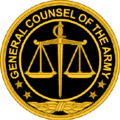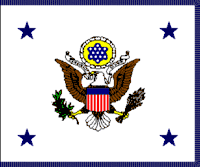General Counsel of the Army
The General Counsel of the Army (also known as the Army General Counsel, abbreviated AGC) is the chief legal officer of the U.S. Department of the Army and senior legal advisor to the Secretary of the Army.
| General Counsel of the Department of the Army
AGC | |
|---|---|
 Seal of the Office of the General Counsel | |
 Flag of the General Counsel and the Assistant Secretaries of the Army | |
| Department of the Army Office of the Secretary | |
| Style | The Honorable |
| Reports to | Secretary of the Army Under Secretary of the Army |
| Seat | The Pentagon, Arlington County, Virginia, United States |
| Appointer | The President with Senate advice and consent |
| Term length | No fixed term |
| Constituting instrument | 10 U.S.C. § 3019 |
| Formation | 1949 |
| First holder | Karl Bendetsen |
| Deputy | Deputy General Counsel |
| Salary | Executive Schedule, level IV[1] |
| Website | ogc |
U.S. law provides that the General Counsel shall be appointed from the civilian life by the President of the United States, with the advice and consent of the United States Senate, and that the Secretary of the Army prescribes the duties of the office.[2]
The Office of the General Counsel of the Army also provides legal advice to the Under Secretary of the Army and the five Assistant Secretaries of the Army, as well as other members of the Army Secretariat. The General Counsel of the Army also plays a role in supervising the Office of the Judge Advocate General and the Office of the Chief Counsel of the United States Army Corps of Engineers.
Partial list of General Counsels of the Army
See also
References
- 5 U.S.C. § 5315
- 10 U.S.C. § 3019
- Profile from Truman Library
- James E. Hewes, Jr., From Root to McNamara: Army Organization and Administration (1975), pp. 381-382
- Jessica Marcy, "Checking in with Joseph A. Califano, Jr.", Kaiser Health News, June 16, 2009
- History of the U.S. Army Corps of Engineers (1998), p. 134
- Jordan's Resume
- Obituary
- From Dept. of the Army History Site
- Profile from the Chicago Network
- See Martin Binkin & Mark J. Eitelberg, Blacks and the Military (1982), p. 90, n. 11
- Nomination of Spurlock to be an Assistant Secretary of the Army
- George H.W. Bush nominates Crawford to be Inspector General of the Department of Defense, Nov. 9, 1989 Archived 2008-08-10 at WebCite
- Bio from Dept. of Defense
- Tamara Loomis, "Did Affirmative Action Really Hinder Clarence Thomas?", Law.com, 06/02/2008
- He had served three and a half years as of March 28, 1998, according to "Army's Top Lawyer Cleared of Charges", Los Angeles Times, March 28, 1998
- "Blanchard Bio from Air Force website". Archived from the original on 2011-06-28.
- Michelle Bates Deakin, "The U.S. Armed Forces: Diversity Starts at the Top", Diversity and the Bar, Jan./Feb. 2003
.jpg)
